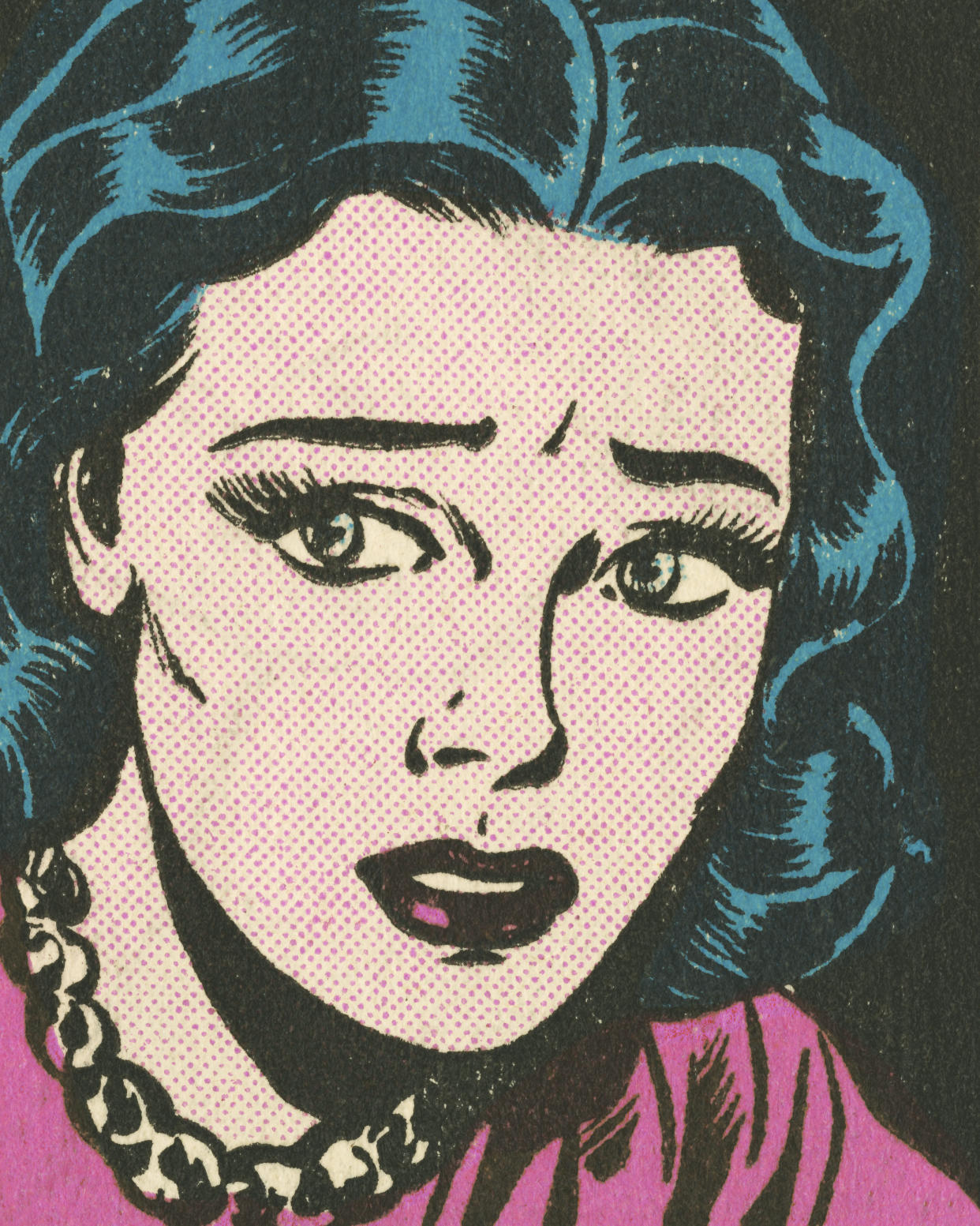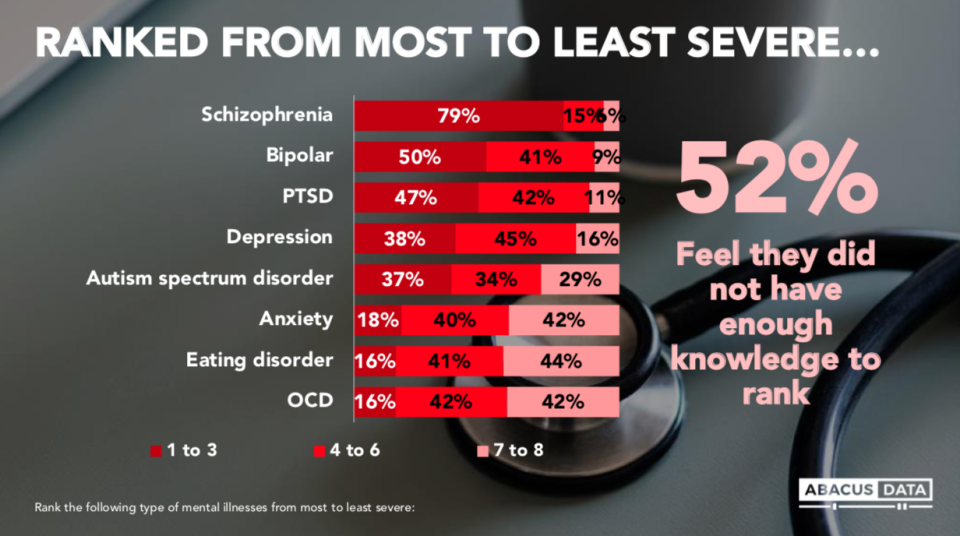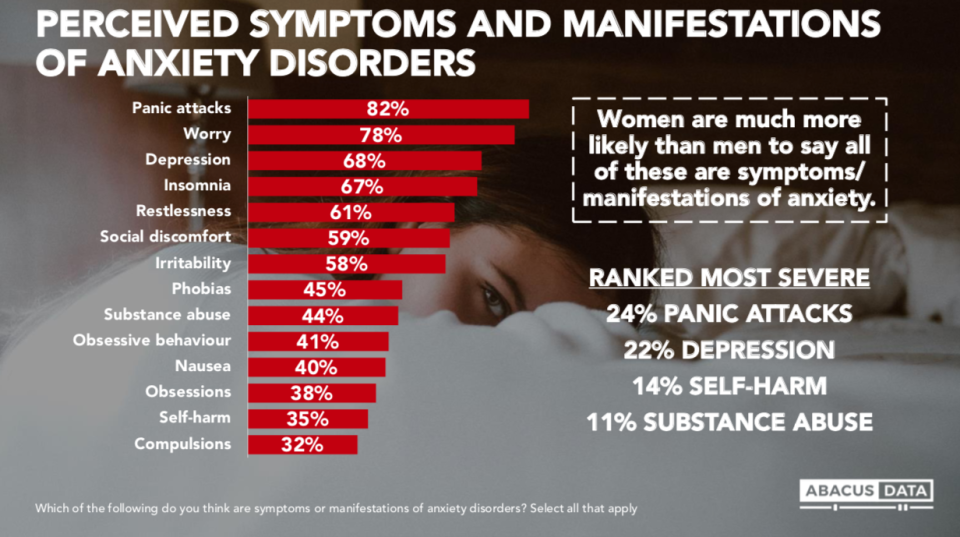Nearly half of Canadians suffer from anxiety — and many believe there's no cure

Nearly half of Canadians consider themselves someone who struggles with anxiety — a population that seems to be constantly increasing among younger generations.
On behalf of Yahoo Canada, Abacus Data ran an exclusive poll of 1,500 Canadians from around the country, asking them some personal questions about anxiety, including: do you feel like you suffer from anxiety? Have you been diagnosed? What do you think is the most severe mental illness?
Forty one per cent of Canadians surveyed consider themselves someone who struggles with anxiety. Think younger generations have it easy? Think again — a whopping 63 per cent of 18 to 29-year-olds self-reported having anxiety. It’s even more prevalent with females — with 71 per cent of “yes” responses coming from females under 30.
Three in 10 Canadians polled have been diagnosed with anxiety by a medical professional and 32 per cent have been prescribed anti-depressants.

Most Canadians (78 per cent) believe anxiety is a medical condition, however, the country is split on whether or not anxiety disorders are curable. Four in 10 Canadians believe they aren’t. And while most agree that it’s a medical condition, Canadians ranked anxiety quite low in terms of what they consider to be the “most severe” mental illness. Only 18 per cent ranked anxiety as the the most severe, while many more said schizophrenia (79 per cent), bipolar disorder (50 per cent) or PTSD (47 per cent) were the most severe ailments.

Meanwhile, most associate anxiety disorders with the symptoms of panic attacks, worry, depression and insomnia. Few think of compulsions, self-harm, nausea or obsessions. A quarter of Canadians (24 per cent) think panic attacks are the most severe symptom of anxiety.

Despite all this, more than half say they wouldn’t change their behaviour around a colleague who struggles with anxiety — but is that for better or worse?
This just scratches the surface of the survey’s findings. Over the next three weeks, Yahoo Canada will be rolling out more than 30 pieces of content exploring anxiety and why it’s so pervasive among Canadians.
Yahoo Canada editor Jonathan Rumley kicks off the series with his thought-provoking piece, Is this the anxiety generation?, which digs deeper into the reasons young people are struggling so much.
Sarah Rohoman examines whether or not anxiety is “curable,” and takes a closer look at how anxiety manifests.
Gail Johnson provides an interesting look at how religion impacts anxiety, while Aisha Chughtai gives a first-hand look at how her father’s death — and how the approach to anxiety in her Muslim family — impacted her own mental health. We also will feature a mother and daughter’s story about how culture has impacted the way their family deals with anxiety.
Meanwhile, Elisabetta Bianchini delves into how money relates to anxiety, and what mental health coverage looks like around the country, while Kathryn Kyte stacks up the cost of anxiety.
Elizabeth Di Filippo opens up about her own experience with dissociative panic attacks, and also explores why children are experiencing an “anxiety epidemic.”
And those are just a few of the highlights. Click here to follow along — and don’t forget to check back for daily releases.
During the month of October, Yahoo Canada is delving into anxiety and why it’s so prevalent among Canadians. Read more content from our multi-part series here.
Let us know what you think by commenting below and tweeting @YahooStyleCA and follow us on Twitter and Instagram.
Abacus Data, a market research firm based in Ottawa, conducted a survey for Yahoo Canada to test public attitudes towards anxiety as a medical condition, including social stigmas and cultural impacts. The study was an online survey of 1,500 Canadians residents, age 18 and over, who responded between Aug. 21 to Sept. 2, 2019. A random sample of panelists were invited to complete the survey from a set of partner panels based on the Lucid exchange platform. The margin of error for a comparable probability-based random sample of the same size is +/- 2.53%, 19 times out of 20. The data was weighted according to census data to ensure the sample matched Canada’s population according to age, gender, educational attainment, and region.



